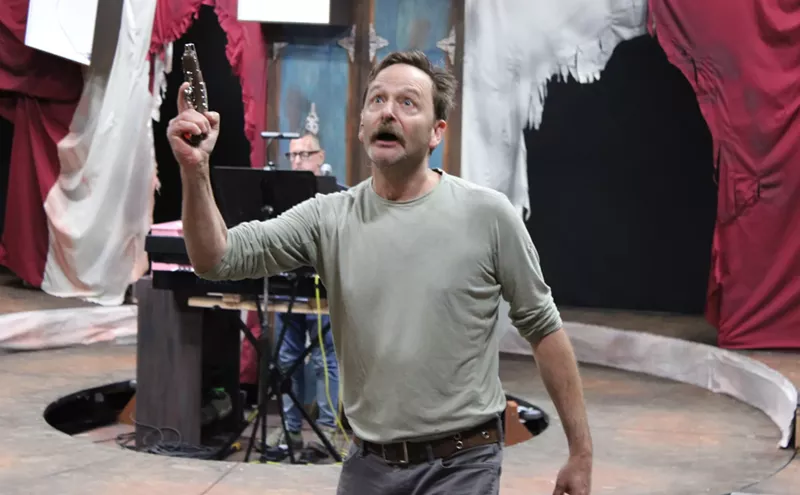There are two major threads in Shakespeare's Twelfth Night. There's the primary plot, in which Viola is shipwrecked in Illyria, decides to dress as a man and signs on as a servant to a local nobleman, Orsino, with whom she rapidly falls in love. But Orsino sends Viola off to court the woman he loves, Olivia, and Olivia falls just as rapidly in love with her. This strand contains all the usual comic male-female identity mixups, but it also carries Shakespeare's ideas about love — the way it confounds and blinds people, abets fantasy and releases wild imaginings.
Then there are the outright funny people who make up the second thread, led by Olivia's uncle, Sir Toby Belch. Belch has coaxed his dissolute friend Sir Andrew Aguecheek into staying at the house and spending large sums on food and drink by telling him he has a chance of winning Olivia. The lusty maid Maria abets Belch in all his plotting, and when Malvolio, a prim-lipped Puritanical steward, annoys this group, they devise a cruel but rollicking joke to bring him down.
This Twelfth Night, directed by Colorado Shakespeare Festival head Philip C. Sneed, is the first joint production of the Arvada Center and the festival. Though broadly serviceable, it misses on both plot strands: Belch and company aren't very funny, and the romantic lovers do no justice to the poetry.
When we first meet Orsino, he's a true courtly lover, melancholy and brooding, instructing his musician, "If music be the food of love, play on/Give me excess of it that surfeiting/The appetite may sicken and so die." Geoffrey Kent's punning, swashbuckling Mercutio was one of the high points of last season's Romeo and Juliet, but he's miscast as Orsino: You just can't believe for a minute that this robust, cheerful guy is sick in love, or even in love with the idea of being in love.
Kate Berry, who plays Viola, is a solid actress, and Rachel Fowler, who plays Olivia, is sometimes an inspired one; under normal circumstances, both women have reasonably pleasant voices. But when they get passionate, their tones become hard, and neither really gets the rhythm of the lines right. So all the gorgeous poetry of their encounters, the subtle shifts of tone and feeling, the differing ways in which love moves their souls — these things get lost; there's just no magic. And I don't think I've ever heard "Build me a willow cabin at your gate" delivered at a shout before. (I'm also baffled by the use of amplification in a space as small as the Arvada Center's Black Box Theater; maybe this is in preparation for the show's return to the outdoor Mary Rippon stage at the University of Colorado this summer.)
The comic characters are no more successful, with the possible exception of Ian Andersen's cheerfully daft Aguecheek. Belch should be Falstaffian — big belly, mugs of ale, uninhibited roaring, over-the-top hilarity — and while Logan Ernstthal has a perfectly workmanlike approach, there's no real juice. Jake Walker is a dour Feste the clown, and even Leslie O'Carroll, for whom the word "irrepressible" might have been invented, gives a damped-down performance as Maria. These people are supposed to be having so much fun that we long to leap on stage and party with them, entirely on their side in the feud with Malvolio — but instead, they leave us cold.
I've seen a couple of great Malvolios, one of them at the Shakespeare Festival itself a few years back: Sean Tarrant, who played the role with a wild, graceful physicality worthy of John Cleese. What I can't figure out is why Sneed cast Timothy McCracken in this production. McCracken is an excellent actor, notable for the fine-tuned, thoughtful intelligence he communicates on stage. But Malvolio needs a certain dumb impermeability, and he, too, should be larger than life. Seeing a man of restrained and subtle sensibility at the mercy of Belch and company is more distasteful than funny.
The program tells us that what was called Illyria is now Albania, so maybe there's some reason for the costuming of Orsino's people — the flower-pot hats you can easily imagine on an organ grinder's monkey, the loose white trousers that broaden butts and thighs, and the pointy, upcurled toes on the slippers — but it's no help to a group of actors who were pretty much miscast in the first place. — Wittman












